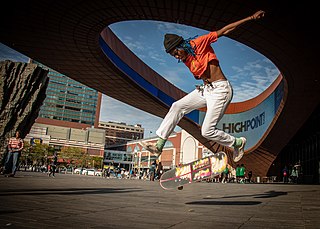
Skateboarding is an action sport originating in the United States that involves riding and performing tricks using a skateboard, as well as a recreational activity, an art form, an entertainment industry job, and a method of transportation. Skateboarding has been shaped and influenced by many skateboarders throughout the years. A 2009 report found that the skateboarding market is worth an estimated $4.8 billion in annual revenue, with 11.08 million active skateboarders in the world. In 2016, it was announced that skateboarding would be represented at the 2020 Summer Olympics in Tokyo, for both male and female teams.

Snowboards are boards where the user places both feet, usually secured, to the same board. The board itself is wider than most skis, with the ability to glide on snow. Snowboards widths are between 6 and 12 inches or 15 to 30 centimeters. Snowboards are differentiated from monoskis by the stance of the user. In monoskiing, the user stands with feet inline with direction of travel, whereas in snowboarding, users stand with feet transverse to the longitude of the board. Users of such equipment may be referred to as snowboarders. Commercial snowboards generally require extra equipment such as bindings and special boots which help secure both feet of a snowboarder, who generally ride in an upright position. These types of boards are commonly used by people at ski hills, mountains, backcountry, or resorts for leisure, entertainment, and competitive purposes in the activity called snowboarding.

Snowboarding is a recreational and competitive activity that involves descending a snow-covered surface while standing on a snowboard that is almost always attached to a rider's feet. It features in the Winter Olympic Games and Winter Paralympic Games.
Boardsports are active outdoor sports that are played with some sort of board as the primary equipment. These sports take place on a variety of terrains, from paved flat-ground and snow-covered hills to water and air. Most boardsports are considered action sports or extreme sports, and thus often appeal to youth. Some board sports were marginalized in the past. However, many board sports are gaining mainstream recognition, and with this recognition, they have enjoyed wider broadcast, sponsorship and inclusion in institutional sporting events, including the Olympic Games.

Powell Peralta is an American skateboard company founded by George Powell and Stacy Peralta in 1978. The company rose to prominence in the 1980s as skateboarding began maturing as a sport. The company featured the Bones Brigade, a team featuring the era's top competitors. Peralta left the company in 1991 and Powell continued to produce skateboard equipment as Powell, Bones Bearings and RollerBones. The two company founders reunited to produce the company's now classic inventory under the name Powell Classic.

A snowskate is a hybrid of a skateboard and a snowboard, intended primarily to allow for skateboard-style tricks on the snow. There are many types depending on the brand or style of snowskate.
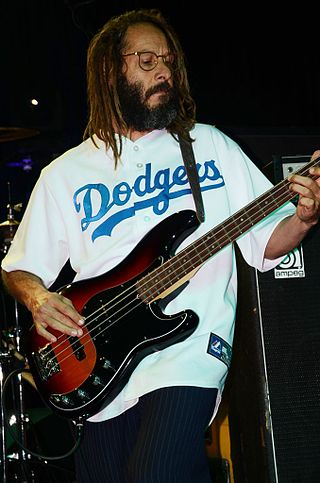
Tony Alva is an American skateboarder, entrepreneur, and musician. He was a pioneer of vertical skateboarding and one of the original members of the Zephyr Competition Skateboarding Team, also known as the Z-Boys. The Transworld Skateboarding Magazine ranked him eighth in its list of the "30 Most Influential skateboarders" of all time.
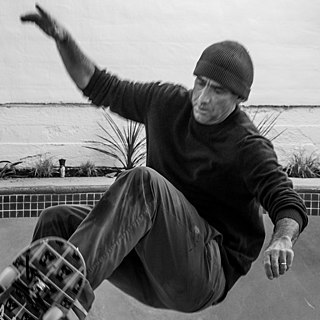
Robert Lance Mountain is a professional skateboarder and artist who was one of the prominent skateboarders throughout the 1980s, primarily due to his involvement with the Bones Brigade. As of August 2017, Mountain continues to skate professionally and his sponsors include Flip, Nike SB, Independent Trucks, Spitfire Wheels, and Bones Bearings.
Warren Edward Bolster was an American skateboard photographer during the mid-1970s rebirth of skateboarding.
A T-board is a longboard skateboard with only two wheels, designed to mimic the sensation of carving on a snowboard. The design differs from a traditional skateboard in a way similar to how rollerblades differ from traditional roller skates. The two wheels simulate a carving edge on pavement. The innovative design allows the board to tilt at a 60-degree angle, like a surf/snowboard, rather than the standard 25 degrees on a skateboard.
Ty Scott Page was a professional skateboarder who was known as one of the most innovative skateboarders in the world. Ty Page was a leader in the skateboarding scene during "the golden era" of skateboarding in the early 1970s. He is best known for creating a freestyle trick called the Ty Hop, which nowadays is known as the "shove-it."

A fingerboard is a scaled-down replica of a skateboard that a person "rides" with their fingers, rather than their feet. A fingerboard is typically 100 millimeters (3.9 in) long with width ranging from 26 to 55 mm, with graphics, trucks and plastic or ball-bearing wheels, like a skateboard. A fingerboard can be used to do traditional skateboarding tricks, such as an ollie and kickflip.
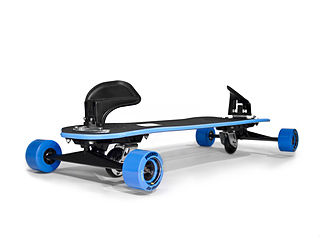
A freeboard is a specialist skateboard designed to closely simulate the behavior of a snowboard. Freeboards were developed to allow snowboarders to transition to skateboarding without the need to adapt to a smaller deck and narrower wheel-base.
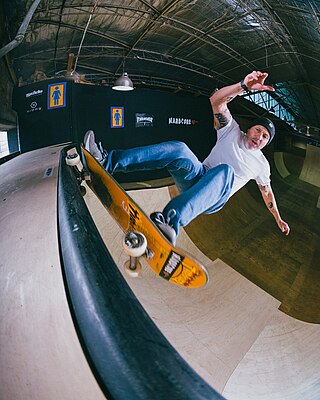
Stephen Hill is a former champion Australian skateboarder and the co-founder of Globe International, a multinational, youth culture, branded footwear, apparel and skate/surf business with his brother Peter Hill. Stephen Hill has also acted as an executive producer on over 30 international media projects including feature films and television specials. Hill has also been involved in several community action projects including promoting new skateboarding facilities and local environmental causes across several countries.
Peter Hill is a former champion Australian skateboarder and the co-founder of Globe International, a multinational, youth culture, branded footwear, apparel and skate/surf business with his brother Stephen Hill. Peter Hill has also acted as an executive producer on over 30 media projects, including feature films and television specials and a producer on Eric Bana's Love the Beast.
Sabre Elle Norris is an Australian surfer, skater, and YouTuber from Newcastle. She is the eldest child of Olympic swimmer Justin Norris and Brooke Norris.
Surfskating, or surf skateboarding, is a form of skateboarding that replicates the experience of surfing on dry land. A surfskate system is distinguished from a traditional skateboard system by the utilization of two different trucks, front and back, with specific functions and geometries that, together, yield thrust, just like a surfboard.

Mike Smith is an American professional vert skateboarder from Southern California. He is also the founder of Liberty Skates, skateboards. Smith is credited as being the inventor of both the Smith Stop maneuver, and of the Smithvert, a personalized variation of the invert.
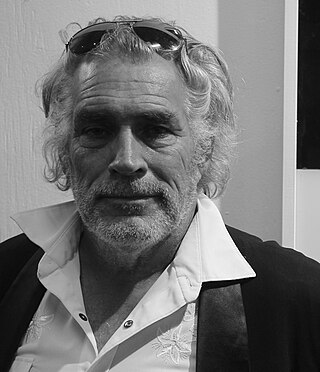
Steve Olson is a 1970s-1980s era American professional skateboarder and contemporary artist originally from Orange County, California.
Skateboarding Hall of Fame, founded in 1997, is a museum and hall of fame located in Simi Valley, California, United States. The museum documents the history of Skateboarding and the skateboarders, photographers, and other notable figures, publications and companies who have influenced its development.












